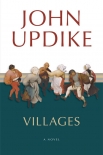Villages by John Updike (best summer reads of all time .TXT) 📗

- Author: John Updike
Book online «Villages by John Updike (best summer reads of all time .TXT) 📗». Author John Updike
viii. Village Sex—IV
Middle Falls lay equidistant from Hartford and Norwich but not very near anything, with the Rhode Island border an endless drive away, those successive Main Streets with their peeling clapboard houses and the glaring franchise strips falling away under the headlights, the old state highway rising and sinking with the former farmland’s hilly roll. The hilltops were blue half the year, naked trees purplish against the snow, and then green. The town had been named after the second of three noisy, turbulent drops in the rocky, fast-running river, the Chunkaunkabaug, which had turned millstones grinding meal of wheat in the eighteenth century and in the nineteenth the power chains of an arms factory supplying revolvers and rifles to the burgeoning West and the Union armies; the rambling brick structure later became a light-bulb factory, in turn abandoned, as Eisenhower gave way to Kennedy, to a swarm of small businesses that, segregating themselves behind partitions of roller-painted plasterboard, rented some fractions of the vast scarred floors, splintered oak perforated by bolt-holes and darkened by the rubber-soled work-shoes of men long buried. Ed and Owen’s start-up occupied first a few cubicles and eventually the second floor and finally the whole thing. Hartford’s insurance companies added themselves to the manufacturers and retailers, banks and investment firms in need of customized computer programming, and E-O gradually prospered. Ed and Owen joined the local middle class.
Most of the people that the Mackenzies came to know were from somewhere else. Some were refugees from New York, half-failed artists licking their wounds and working in their homes; some commuted to Hartford, serving the state government or the insurance industry; a few were professionals, lawyers and contractors and pediatricians, content with the relatively thin local pickings in exchange for the old town’s tonic air of freedom, a freedom bred of long neglect, of being bypassed and as yet little spoiled, of being no place special and triumphantly American in that. These immigrant citizens all shared the assumption that their village was ineffably special and superior, rakish yet stylish; by comparison, Lower Falls was a virtual ghost town—a gas station, a convenience mart, and a little brick post office amid a scattering of run-down barns and sheds and vegetable stands and rusting mechanical remnants from a viable rural past—and Upper Falls a dreary bedroom community on the far edge of Hartford’s sprawl, with flat tracts of ’fifties ranch houses, gimcrack “starter homes” built on a slab. In Middle Falls, Federalist mansions, waiting for a coat of paint, safer wiring, and a new furnace, stood around the triangular green, once a common pasture and still called the Common. Farther out, charmingly Spartan farmhouses from later in the nineteenth century, with acreage for horses or a tennis court, also could be picked up reasonably, in the low five figures. There were a few surviving pre-1725 structures, with massive central chimneys, small windows, and saltbox profiles; they had been turned, by and large, into antique shops or candlelit, low-ceilinged restaurants. There was a minimal country club, with a nine-hole golf course and four clay tennis courts, and a lake, called Heron Pond, with imported sand, a shallow section roped off for toddlers, and a tall white lifeguard-chair occupied, when it was occupied at all, by the seal-shaped, mahogany-brown teen-age daughter of the local high-school principal. The key to her chest of medical supplies was worn on a red elastic circlet around her ankle, and her long black hair, as straight and as matte a black as a Native American’s, was caught back in another such utilitarian elastic. She had not only a seal’s adipose shape but a seal’s style of basking as she lazed, with half-closed eyes, above the mothers and children and the adolescent boys whose roughhousing and splashy horseplay over by the rope swing occasionally brought her upright, the whistle shrill in her zinc-oxided lips.
Here on this lightly lapped crescent of trucked-in beach the town’s vivid young matrons burnished themselves in bikinis or, as the lakewater autumnally cooled but still kept small children entertained, gossipped at the picnic tables, smoking cigarettes and nibbling bits of the children’s lunches they had packed: “I swore I’d never eat Marshmallow Fluff again and yet here I am, an absolute addict! Peanut butter and jelly, don’t talk to me about it—it’s making me fat! But it’s so much easier, when you’re throwing sandwiches together for their lunch anyway, to make one extra for Mommy!” This was Alissa Morrissey, talking to, say, Faye Dunham and Imogene Bisbee. Newcomers to motherhood and one another, the women had quickly grown into a familiarity that allowed them to utter whatever floated to the tops of their heads. They seemed to Owen to have a collective loveliness, like that, in his threadbare childhood, of Ginger Bitting and her brown-legged satellites. But now he was more closely among them, as if he had moved up from Mifflin Avenue to Second Street. His wife, with her fondness for sunbathing, and her trio of small children—the infant, Floyd, had been named after his paternal grandfather—joined them. She reported back, “They’re like Army wives, but not so coarse and vapid. They’re nice, if a little superficial. All they seem to think about is other people—their children and their husbands. And each other. When one of us doesn’t show up, she gets it. In the nicest possible way.”
In Middle Falls, all personalities were studied, cherished, and glamorized. Women reigned; the wives lent fascination to their husbands. Husbands and wives were biform creatures, semi-transparent so that each could be seen





Comments (0)